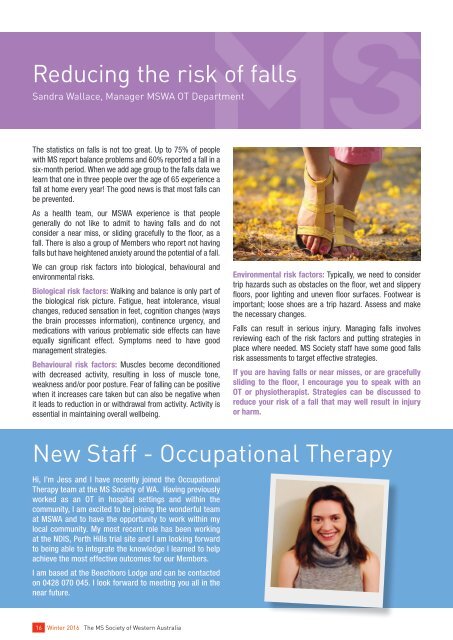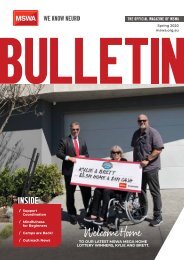You also want an ePaper? Increase the reach of your titles
YUMPU automatically turns print PDFs into web optimized ePapers that Google loves.
Reducing the risk of falls<br />
Sandra Wallace, Manager <strong>MSWA</strong> OT Department<br />
NDIS Update<br />
Nigel Carey, NDIS Business Development Manager<br />
The statistics on falls is not too great. Up to 75% of people<br />
with MS report balance problems and 60% reported a fall in a<br />
six-month period. When we add age group to the falls data we<br />
learn that one in three people over the age of 65 experience a<br />
fall at home every year! The good news is that most falls can<br />
be prevented.<br />
As a health team, our <strong>MSWA</strong> experience is that people<br />
generally do not like to admit to having falls and do not<br />
consider a near miss, or sliding gracefully to the floor, as a<br />
fall. There is also a group of Members who report not having<br />
falls but have heightened anxiety around the potential of a fall.<br />
We can group risk factors into biological, behavioural and<br />
environmental risks.<br />
Biological risk factors: Walking and balance is only part of<br />
the biological risk picture. Fatigue, heat intolerance, visual<br />
changes, reduced sensation in feet, cognition changes (ways<br />
the brain processes information), continence urgency, and<br />
medications with various problematic side effects can have<br />
equally significant effect. Symptoms need to have good<br />
management strategies.<br />
Behavioural risk factors: Muscles become deconditioned<br />
with decreased activity, resulting in loss of muscle tone,<br />
weakness and/or poor posture. Fear of falling can be positive<br />
when it increases care taken but can also be negative when<br />
it leads to reduction in or withdrawal from activity. Activity is<br />
essential in maintaining overall wellbeing.<br />
Environmental risk factors: Typically, we need to consider<br />
trip hazards such as obstacles on the floor, wet and slippery<br />
floors, poor lighting and uneven floor surfaces. Footwear is<br />
important; loose shoes are a trip hazard. Assess and make<br />
the necessary changes.<br />
Falls can result in serious injury. Managing falls involves<br />
reviewing each of the risk factors and putting strategies in<br />
place where needed. MS Society staff have some good falls<br />
risk assessments to target effective strategies.<br />
If you are having falls or near misses, or are gracefully<br />
sliding to the floor, I encourage you to speak with an<br />
OT or physiotherapist. Strategies can be discussed to<br />
reduce your risk of a fall that may well result in injury<br />
or harm.<br />
New Staff - Occupational Therapy<br />
Hi, I’m Jess and I have recently joined the Occupational<br />
Therapy team at the MS Society of WA. Having previously<br />
worked as an OT in hospital settings and within the<br />
community, I am excited to be joining the wonderful team<br />
at <strong>MSWA</strong> and to have the opportunity to work within my<br />
local community. My most recent role has been working<br />
at the NDIS, Perth Hills trial site and I am looking forward<br />
to being able to integrate the knowledge I learned to help<br />
achieve the most effective outcomes for our Members.<br />
I am based at the Beechboro Lodge and can be contacted<br />
on 0428 070 045. I look forward to meeting you all in the<br />
near future.<br />
There have been some exciting new developments in the<br />
National Disability Insurance Scheme (NDIS) since our<br />
last <strong>Bulletin</strong>.<br />
As you may know, the NDIS is a Federal and State funded<br />
program to support people with a disability that affects their<br />
ability to take part in everyday activities. It supports people<br />
living with all types of disability including MS and a wide range<br />
of neurological conditions including Huntington’s, Stroke,<br />
Parkinson’s, Motor Neurone Disease and acquired Brain Injury.<br />
As you may be aware, the NDIS trials are currently operating<br />
in the Perth Hills (Shires of Mundaring, Kalamunda and<br />
Swan), the Lower South West (Busselton and surrounds) and<br />
the Cockburn-Kwinana areas.<br />
Finally, we have had some news regarding the further<br />
rollout of the trial sites in WA! From 1 October the WA NDIS<br />
will be expanded to include the Armadale, Murray and<br />
Serpentine-Jarrahdale areas. Further expansion will then<br />
occur from January 2017 to include Bayswater, Bassendean,<br />
Chittering, Toodyay, York and Northam.<br />
These expanded trial sites will prepare the ground for the<br />
final rollout of the NDIS throughout WA from 1 July 2017. The<br />
Commonwealth and State Governments will now work closely<br />
together on the details of this State rollout and the final NDIS<br />
model is expected to be agreed on later this year.<br />
This is being done in partnership with people with disability,<br />
carers and service providers. This consultation process will<br />
allow all stakeholders to meaningfully consider the results and<br />
lessons learned from the existing trials sites which vary slightly.<br />
Next month we will be communicating with all Members and<br />
clients who live in the new Armadale, Murray and Serpentine<br />
trial sites and making them aware that they will soon become<br />
potentially eligible for the NDIS.<br />
We will also be hosting information sessions to clarify<br />
entitlements and outline the opportunity to access funding for<br />
a wider range of supports and services.<br />
The benefits include:<br />
• Supports to assist with daily living. For example, with<br />
personal care, home help and shopping<br />
• Support for aids and equipment, vehicle and home<br />
modifications and assistive technologies<br />
• Support to help with social and community participation.<br />
For example, support to enjoy more local and family events<br />
and also support for your partner or carer.<br />
Over the past month, our team has been talking with a wide<br />
range of Members and clients who are already in the process<br />
of applying to the NDIS. It is clear that some confusion and<br />
misunderstandings remain about the scheme and that people<br />
are looking for guidance about their entitlements.<br />
Our experience has been that the earlier <strong>MSWA</strong> is involved<br />
in this process providing information and support, the more<br />
successful and all-embracing the final application is. For<br />
example, it has proved very useful to involve <strong>MSWA</strong> prior to the<br />
planning meeting itself. We can then work together with you to<br />
map out holistically the kind of supports that will enhance your<br />
overall quality of life. This will enable you to maximise your<br />
entitlements at the actual planning meeting with NDIS.<br />
In summary you will know very clearly what your entitlements<br />
are and what you can ask for.<br />
Incidentally a key focus of the NDIS is on ‘early intervention’<br />
where obtaining access for early supports can potentially<br />
significantly reduce the impact of disability on you and your<br />
life. It could enable you to continue working full time if relevant<br />
supports (eg fatigue management) are in place. Do remember<br />
to include this, if relevant, in your plans.<br />
Keeping in contact with the team<br />
We are committed to making it easier for you to contact us<br />
to ensure you are gaining maximum benefit from the NDIS.<br />
<strong>MSWA</strong> has established a dedicated team, phone number,<br />
email and website; details are as follows:<br />
Phone: 1800 287 367<br />
Email: ndisenquiries@mswa.org.au<br />
Visit: mswa.org.au/NDIS_services<br />
We have also increased the number of Client Relationship<br />
Coordinators to ensure a smoother and easier customer<br />
pathway for you.<br />
Our dedicated team is in place to take you from learning<br />
about the scheme through the initial planning stages and<br />
then to implementation.<br />
Our contact details are as follows:<br />
Mark Douglas: Operations Manager<br />
Email: mark.douglas@mswa.org.au<br />
Phone: (08) 9365 4824<br />
Christine Richards: Client Relationship Coordinator<br />
Email: christine.richards@mswa.org.au<br />
Phone: (08) 9365 4867<br />
<strong>16</strong> <strong>Winter</strong> 20<strong>16</strong> The MS Society of Western Australia The MS Society of Western Australia <strong>Winter</strong> 20<strong>16</strong> 17


















